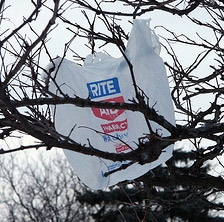JON BROOKS: I was very surprised to hear your contrarian view on plastic bags versus paper. I sort of view paper bags with this halo effect – in San Francisco, where I live, you can recycle the paper bags but the plastic has to go into landfill. So describe your view on this issue ...
AMY STANDEN: Well first of all, plastic bags do have a major strike against them. They're aerodynamic. They get caught in the wind. So. that is the primary reason cities tend to ban them. In San Francisco, grocery stores don't give out plastic bags. That's because plastic bags end up in places they're not supposed to. You think you're throwing them in the trash, but actually they're blowing out of your can, they're getting into a tree, maybe they're getting into a waterway. They're just a mess, and that's why they end up as litter so often.
And if you go to a recycling center, you'll see they gum up the works, and they have to shut down the system every couple of hours for the workers to manually go through and cut them out of the gears.
But my contrarian view is that other than that, they're both pretty bad. Plastic and paper both take a lot of energy to produce. Some say paper takes more energy. Paper weighs a lot more than plastic, and so one of the figures you hear a lot from the plastic bag industry is that it takes seven trucks to transport the same number of paper bags versus plastic bags. I have no way of fact-checking that figure, but it's common sense to think that you're going to need more trucks to transport paper bags than plastic bags. More trucks mean more air pollution in neighborhoods like West Oakland. More trucks mean greater greenhouse gas impact.
JON BROOKS: But what about the landfill and the recycling issue? I can recycle my paper bags but I can't do that with my plastic bags?
AMY STANDEN: One thing you hear from the paper bag advocates is that plastic bags live forever in the landfill. But everything lives for many, many years in the landfill. You can go to a landfill and find a hot dog that's literally 25 years old. That's because landfills are designed not to let the stuff in them biodegrade. They're anaerobic, no oxygen. And there's also very little water in landfills. Which means the stuff lasts forever. So a paper bag is not going to decompose in a landfill either, at least not on any meaningful time scale. So you may have more plastic bags than paper, but the paper bags are taking up a lot more space than the plastic bags.
And, frankly, in San Francisco, we're already diverting 75 percent of our waste away from the landfill. So our landfills aren't actually taking in a lot of stuff anyway.
JON BROOKS: What about the marine mammal issue? Environmentalists say marine mammals will try to eat them [plastic bags], and those are harmful ...
AMY STANDEN: Absolutely true. Plastic bags end up being litter more often than we intend for them to. So that is a very real problem. And that is, when it comes down to it, the real reason that you see many cities wanting to have these bans. Another count in paper bags' favor is they can be composted, so you can fill them with your food scraps and put them in the compost bins. But that's only meaningful if you live in a city that has a composting program.
JON BROOKS: Well, if paper is not the solution and plastic is not the solution, what is?
AMY STANDEN: Neither of these types of bags is very good. Plastic bags are recyclable just like paper bags, but neither of those things has a complete cycle. Both of these things are downgraded. Plastic bags don't get recycled into more plastic bags as you'd want them to; they get recycled into things like plastic flooring or carpets -- which in turn are not recyclable or at least very difficult to recycle.
Paper bags get recycled -- not usually into more paper bags but into cardboard. That's a little better because cardboard itself is recyclable. But in neither case is recycling the be-all and end-all, the grand solution. If you care about greenhouse gases and waste, the best solution would be to not get a bag at all. Or to carry a cloth bag or bring your own bag.
It should be noted that in 2012, San Francisco passed an ordinance requiring stores to charge 10 cents per paper bag, in hopes of spurring consumer use of reusable bags. (On the other hand, San Francisco also requires you to compost, and in my household we used the paper bags for that. So we often find ourselves shelling out for the paper bags anyway. Are you listening, oh God of Damned if You Do Damned if You Don't?)
